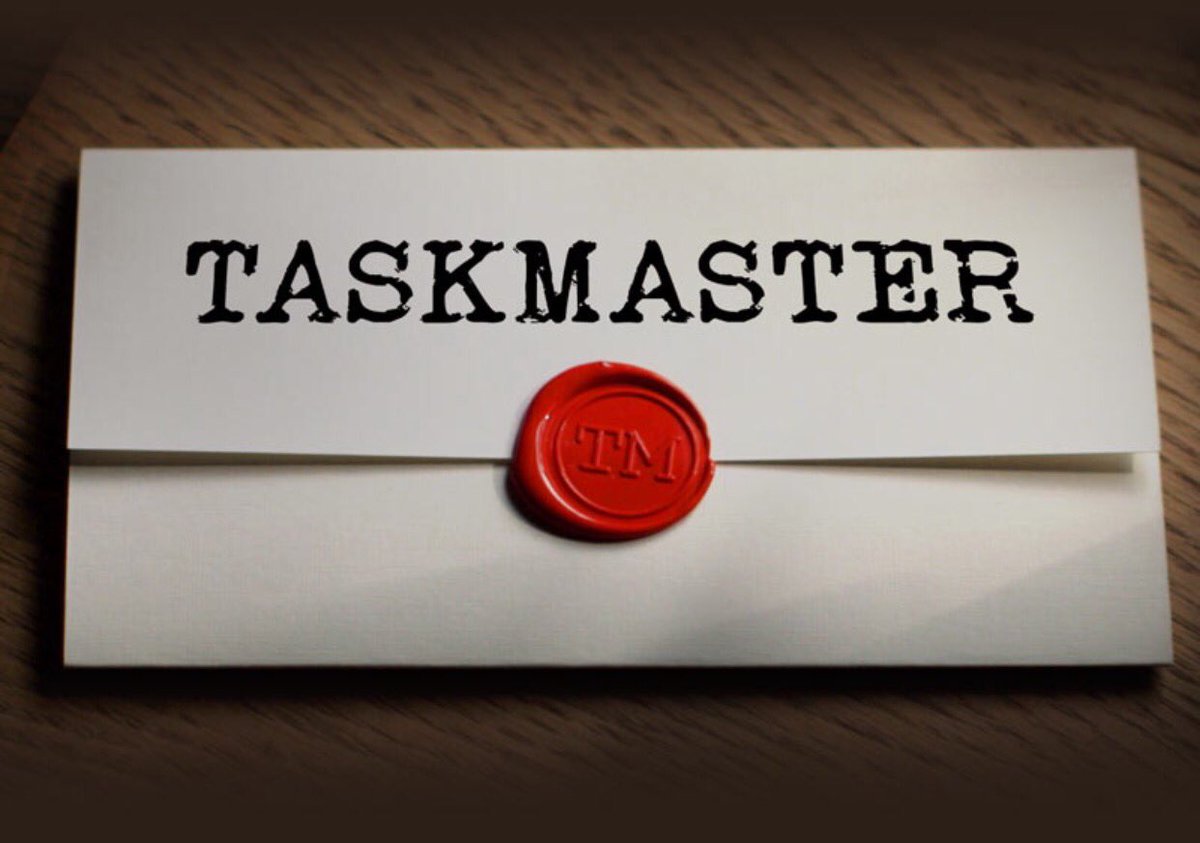A businessman, on his way to an important conference, checks into his hotel. The businessman is rude, brusque, demanding. Ungracious and ungrateful, he is ready to make all sorts of imposing and unreasonable demands upon the cozy hotel’s staff.
But today, he has met his match. Over the next half hour, the businessman will be subjected to a wide range of increasingly bizarre indignities, as the hotel staff leer at him through his window. “Nice legs” one of them coos at him as he hurries away. Another lurks for him in his room, hidden behind a corner until the businessman has entered. On encountering rising smoke in the lobby, the oldest staff member barely reacts, languidly remarking, “Oh, is there a fire? How awful,” and half-heartedly beating at the smoke with his hands while opening a window. It seemingly takes him several minutes to sound the fire alarm.
“You need treatment,” the staff dystopically assure the businessman, forcing him into a mock spa. When the fire alarm is finally raised, one of the hotel staff seemingly has no idea what’s going on, asking the businessman if the police are after him. Upon delivering an order from room service, several of the staff members clamber into bed with the businessman, continuing to objectify his legs. When at last, the businessman elects to check out, every single member of the hotel’s staff comes to the door to watch him leave, one of them inexplicably plying him with bedding from his room, even as another tries to shoo him away. Terrified and unhappy, the businessman leaves this ghastly nightmare, the staff gazing unsettlingly after him.
This is Taskmaster. More precisely, this was the final task of the most recent series, series 16. The businessman, an act (and the actor in question, really the brains behind the entire scenario and operation). The hotel itself, a sham. Yet the staff of the hotel, strangely real; if in a heightened and comic meaning of the word “real.”
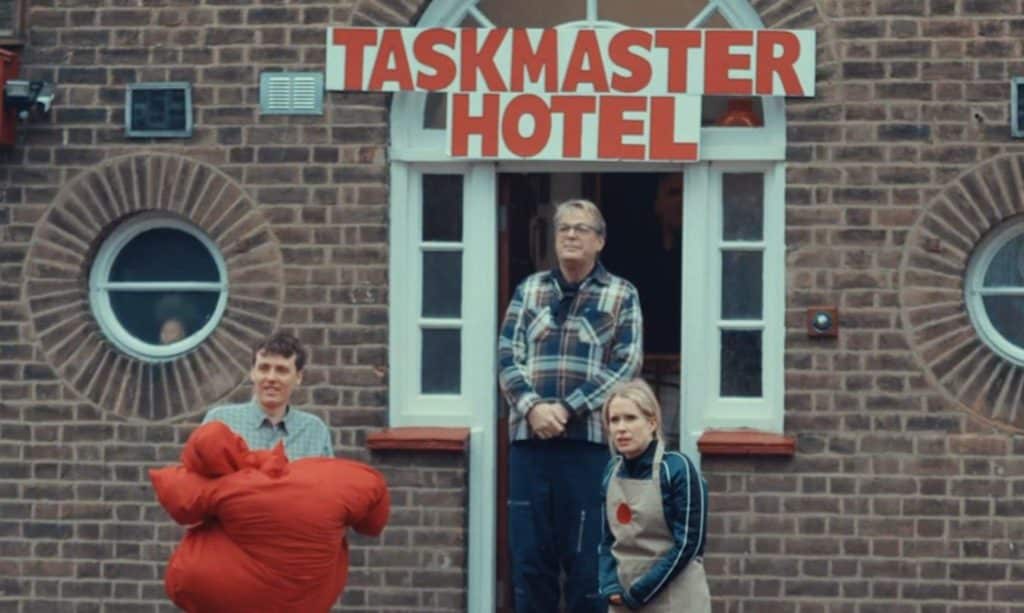
For those who might be unfamiliar with Taskmaster, there’s little point in trying to explain it – the best solution is to settle in and to watch it. But explain it I shall, with any sort of luck.
Taskmaster belongs to that venerable genre of British panel shows that seem to permeate the TV programming of those peculiar islands. Yet Taskmaster has, ever since its very first season, been somehow elevated or separated from other such shows in the genre, too.
One obvious distinction is Taskmaster’s reliance upon exterior locations and activities…rather than relying upon in-studio activities, much of Taskmaster’s runtime is taken up with watching how the contestants have already gone about completing a pre-filmed task, and then commenting upon it (and occasionally, wonderfully, furiously debating it) in the studio. Part of that might be due to the fact that Taskmaster takes its actual “games” rather more seriously than most other panel shows. In a typical panel show, there’s often a sense that the points don’t really matter, that the important thing is the game right now.
The points matter on Taskmaster…boy do they matter. How much they matter will depend on the individual, but there is no denying that they matter. This, in turn, may be caused by the fact that unlike most panel shows, the cast of a single series of Taskmaster remains constant throughout an episode. Rather than having a rotating panel, it is truly a competition between five different people, their scores carrying over from week to week as they jostle among themselves to be crowned the latest Champion.
Less unusually, the co-hosts of Taskmaster also never change, within or across a series. The true mastermind behind the series, (Little (he’s actually 6’1”)) Alex Horne, is a constant by virtue of his being present for both the pre-filmed and the studio portions of the show. And, by his side, the tyrannical, the irritable, and the easily amused Greg Davies, the titular Taskmaster himself.
It is with the Taskmaster that I want to start this discussion. See, there’s a lot of reasons to love Taskmaster. Many fans enjoy the comedy aspect, enjoy the thrill of watching very clever people do very stupid things (or sometimes very clever things) in very stupid situations. Others enjoy the statistics, the points, enjoy analysing contestants according to particular criteria or endlessly debating the rulings of Greg. And to be clear, I adore these elements of the show.
But there’s a less-remarked upon, almost invisible facet as well, which I want to dwell on today. I want to consider Taskmaster from its actual, fictional premise. I want to strip away the “facts” of it, to forget that Greg is simply a comedian for hire with a teacher’s background, or that Alex is the real power within the show. Unusually and notably for a panel show, Taskmaster does contain an overarching artifice and fiction, however subtly…and I think that fiction is crucial to the show’s joy.
To put it in a way that Taskmaster fans will understand, “Let’s drill down into the narrative.” The narrative of Taskmaster itself.
So let’s talk about the actual premise and internal mythology of the show, such as it is. Taskmaster is not a show that relies upon imposed narrative, nor upon consistency and lore. Often details are included that reward repeat viewers across seasons, and within any given season, it is possible to watch a narrative arc evolve and develop for one or more of the contestants. But there’s no “plot”, no canon, nothing like that. Further, the contestants themselves are not “acting”, at least for the most part (though I want to return to this point later). They are not playing characters, or working to a script.
However, there is a premise nonetheless, and I want to spend a moment on that premise, because it’s an easy one to forget – yet I think it is at the heart of the show, and the show’s genius.
In Taskmaster, there is a man, the Taskmaster – Greg Davies. He sets tasks for people to fulfil, and then his assistant, the beleaguered Little Alex Horne, goes out and makes some people do the tasks. Then, the Taskmaster reviews these attempts, giving out points to those who he thinks have earned them.
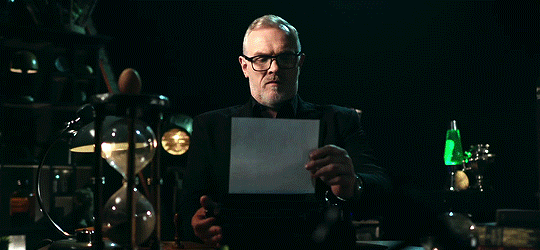
That’s it. That’s what the show is “about.” And…well, it doesn’t need any more than that. Like I said, this is not a show built upon narrative, and indeed, within the show itself it is rare for contestants, Greg, or Alex to actually acknowledge the premise (I rather suspect it would become very quickly wearing if they insisted upon being slavish to it). However, the premise is there, and has been maintained across sixteen seasons at this point, however inconsistently and flimsily and lacking in elaboration. Yet to me, that lack of elaboration concerning the core explanation adds to the show, rather than detracting from it.
For example, who (or what) is the Taskmaster, exactly? He’s clearly a being with extraordinary resources, at least. Why does he need these very very silly and pointless tasks to be done at all? And why must they be done by five separate people…well, except for when they’re done by two groups of people, or just one person, or even occasionally one person while the other four do something complementary yet distinct?
And why does the Taskmaster then gather those people, and comment upon and judge their tasks? Why do the Taskees cooperate at all? Why does the Taskmaster’s Assistant facilitate all of this? He clearly wants the Taskmaster’s will to be done, else he would not present the tasks to the Taskees. Yet he also often seems to hinder the tasks, and it is rare indeed for him to help – why? He clearly is not trying to actually help fulfil the task, yet he wants them done for the Taskmaster.
These questions are pointless and meaningless, and there’s no reason to try and seriously answer them. But given the faceted intersections between fiction and reality of Taskmaster, I do think that they are important questions! It would, after all, be easy enough to imagine a version of the show that does away with the premise all together, or to imagine something semi-scripted that tries to tell a story. The fact that Taskmaster has a premise at all makes that premise worthy of interrogation.
And like I said, I do not think there is an answer to what the Taskmaster “is”, but there is an extraordinary striking parallel to be drawn, too. Put simply, Taskmaster isn’t really a panel show at all. It is a fairy tale.
Now it came to pass that after the battle with the Minyans Hercules was driven mad through the jealousy of Hera and flung his own children, whom he had by Megara, and two children of Iphicles into the fire; wherefore he condemned himself to exile, and was purified by Thespius, and repairing to Delphi he inquired of the god where he should dwell. The Pythian priestess … told him to dwell in Tiryns, serving Eurystheus for twelve years and to perform the ten labours imposed on him, and so, she said, when the tasks were accomplished, he would be immortal.
When Hercules heard that, he asked how these ten labours were to be achieved. And the priestess did say unto him, “All the information is on the task.” And Hercules did groan, and did continue to try and kick a basketball through a basketball hoop without using his hands.
(Mostly) Apollodorus, 2.4.12

The impossible or meaningless task is a staple of mythology and of fairy tales. Sisyphus, Rumpelstiltskin (or the princess Rumpelstiltskin visits, anyway), and yes, the mighty Hercules have all faced such tasks, tasks that seem both impossible and ludicrous. “Come before me neither clothed, nor naked,” commands the capricious king, and lo! the heroine wraps herself in a fishing net to fulfil her obligation. “Behave chastely with my wife,” Lord Bertilak instructs Sir Gawain – a relatively easy obligation to fulfil in principle, provided that Lady Bertilak does not purposely seduce the knight as part of the larger test! Drink this lake, tame that horse, draw water from a well with a sieve – many a fairy tale’s challenge reads as if it were sealed within the distinctive TM envelope.
But I think that fairy sense of irreality that Taskmaster delights in goes beyond the superficial, too. There is, to me, a very real intersection between truth and fiction in the show, that somehow elevates both. Take, again, the Taskmaster. As presented in the show, the Taskmaster is a character, and yet also award-winning comedian Greg Davies. It is an “act”, in the sense that Greg plays for the moment and for the character…yet somehow this act does not make it less real.
Take, for example, one of the more celebrated elements of the show, the dynamic between Greg and Alex – on set, Greg bullies, dismisses, growls and snaps at Alex, who meekly takes it all in stride, seemingly wanting only to please the bizarre and irrational needs of his Taskmaster.
Greg: Once I put the Taskmaster suit on, I become someone else.
Alex: Yeah, even our relationship: it’s odd but we do instantly have a different relationship.
Greg: It is odd because it’s all very cordial off set, but as soon as I step onto set, there’s just a natural irritation I feel towards you.
From an interview with Greg and Alex by Channel 4, emphasis mine
Offstage, Greg Davies and Alex Horne are perfectly collegial coworkers, who’ve even developed into friends over the course of the show. Yet on stage, the Taskmaster and the Assistant is all we see. Both of them are, literally, different people. Not wholly different, perhaps – it is not unfair to guess that Greg Davies the man likes food, and dislikes football, or that Alex Horne likes whimsy and enjoys subversion. But again, that marriage of realness and fantasy heightens both characters.
Further, the Taskmaster’s needs may be entirely irrational, yet there is a certain consistency to the character himself. He has his likes and his dislikes, and he has patterns and modes of behaviour. His judgements may not always be “fair” (to the perpetual dismay of many fans), but they are always the judgements of the Taskmaster himself, and that seems more important to me. And, as Greg himself has gone on record as saying, Greg Davies the comedian is fully aware that the show’s tasks are silly, meaningless, useless. Greg Davies himself doesn’t really care about the tasks.
But the Taskmaster cares. The Taskmaster has set these tasks, and for whatever eldritchly inscrutable reason, the Taskmaster wants these tasks to be done, and to be done well. The Taskmaster is genuinely furious when one of these little people before him makes a mess of a task, or treats it with disrespect, because that goes against tasks and Taskmaster alike. That, dear readers, is some fey-king logic right there.

Speaking of the character of the Taskmaster, part of the joy of the show is (I think) that it is a show about real people (if very funny and quick-witted people) doing absurd and unreal things. This intersection between real and fake is difficult to do well, I think. Plenty of reality shows try to straddle it, and often end up the poorer for it. But in Taskmaster, the artifice of the premise, and the silly nature of the tasks, gives the contestants something tangible to play with. There’s no “threat”, no danger, in Taskmaster…neither literally (of course) or even figuratively.
There are multiple interviews in which Alex Horne claims (fairly, I think), that the idea of Taskmaster is not to humiliate or shame people. Sometimes they happen to be humiliated, but it’s not the “point”. Because of the show’s artifice and silliness, even when someone fails and fails badly, it does not reflect badly upon them, rather adding up into an ever more surreal picture. And because the character of the Taskmaster wants the tasks to be done well, the withering scoldings lashed upon the less successful attempts do genuinely feel like an enraged emperor berating his minions, rather than anything more personal…and when something is done well by everyone, the Taskmaster is in turn genuinely pleased, there’s never a sense that there must be a ‘loser’ for the sake of having a loser.
All of this is to say that, by creating this fake world and making it just real enough to matter, the actual contestants are, I think, able to really fully enter into the play-world, and to be themselves. It’s a childlike, fairyland type of logic, yet that heightens its effectiveness, I think – and it is distinct to nearly any other show on TV, too.
There’s often a question raised, especially about the more “out there” contestants, as to how much of their character is an act or not, and (at least to me), it really doesn’t matter. Or to rephrase it, I’m pretty sure everyone who has ever competed on Taskmaster has been acting – acting like they would if they were on Taskmaster. Mike Wozniak, for example, one of the more memorably odder recent contestants, was almost certainly “acting” on the show. But I don’t doubt that Mike also “acts” when he’s with his family, or with his friends, or going to the bank. Every action that Mike Wozniak takes is, almost by definition, “acting.”
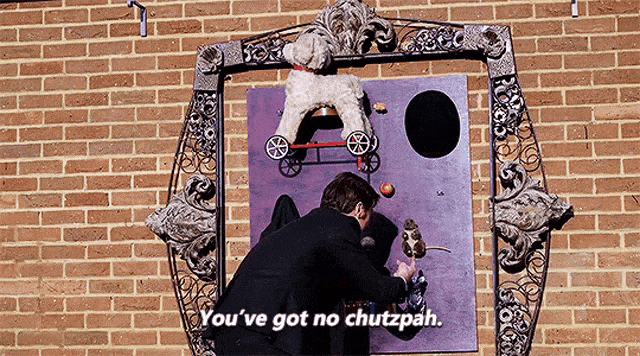
We all of us are “acting”, all the time…some less consciously than others, and some with fewer gradients of character than others, but we’re all always acting. So too are the Taskmaster contestants…but they are acting as themselves, or a heightened version of themselves, in that heightened fairy tale world of Taskmaster. Again, it’s a blend of reality and this strange irreality, that allows the performers to, well, perform, and to do so in an exceedingly liberated environment.
Notably, pretty much everyone who’s appeared on Taskmaster has done so as themself, including people who’re broadly known for playing a character (or characters) on stage and TV…Al Murray, Morgana Robinson, and John Kearns all come to mind. In short, Taskmaster’s own internal artifice allows a remarkable degree of spontaneity and sincerity.
The nightmare hotel described above is an excellent example of this – if it were “realer” (say, with an unwitting actual guest instead of Alex playing the part), it would be uncomfortable and distressing. If it were less real (scripted, or at least planned, or featuring “characters” that the teams were playing as), it would be dull and uncompellling. The blend of fantasy and reality and spontaneity is exactly what allows the scenario to live. It’s utter genius. And again, it’s a fairy tale – it’s real people, transported to some elfland and doing their best to abide by its topsy-turvy rules. Taskmaster is successful when it transports its contestants (and us) to its own bizarre, yet consistent and compelling sub-created irreality.
There’s yet another distinctively fairy element to Taskmaster, namely, the precision of the tasks themselves, and the abuses that this precision allows. “It’s a show about pedantry!” Frankie Boyle wailed as he and Ivo Graham debated whether “white” is a colour or not; and Frankie is not wrong. But pedantry was the domain of the elves, long before we found it and crudely adopted it. And the pedantry of Taskmaster is almost always based in some principle of “fairness”, even with an equal streak of sadism.
Instructing comedians to transport “the” bag of salt from point A to point B, and leaving a bag of sugar right next to the task, is fair game – one would imagine calling it “this” bag of salt would be unjustly deceptive, but the task never said “which” bag of salt, and so it stands! So, too, is the typical Taskmaster double punch of having the contestants construct something technically edible…and then instructing them to eat it as part of a separate task. Or the myriad obtuse clues that are sometimes scattered about, and almost never found.
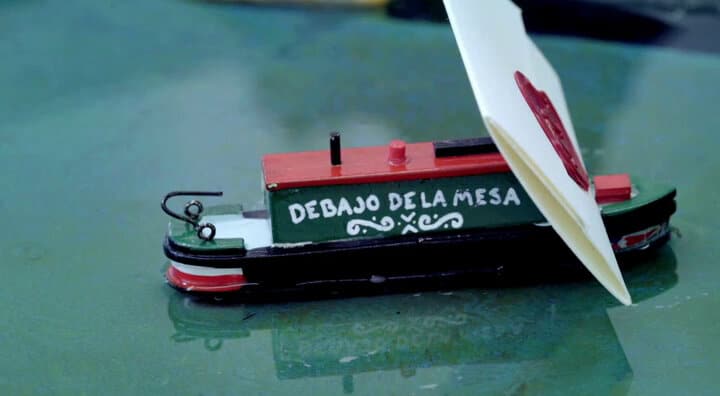
And this pedantry, this potential for discovering loopholes, cuts both ways, too. For many people, the early defining moment of this came at the beginning of series 2, with a task that read as follows:
Place these three exercise balls on the yoga mat on the top of that hill. The task is complete when all three balls sit fully inflated and stationary on the mat.
Four of the contestants duly sweated and toiled their way up “that hill”, unruly exercise balls in tow. The fifth? Ran up the hill and grabbed the mat, arguing that “the yoga mat on the top of that hill” was a descriptor of the yoga mat’s current location, and not a binding command regarding the eventual destination of the exercise balls.
He won the task.
And, though Alex and the team have gradually yet discernibly become more careful in their phrasings over the seasons, in part to discourage “easy” solutions, there continue to be gaps that can be exploited and discovered, exercises in creative thinking and in ignoring the spirit of the task whilst fulfilling it to the letter – again, classic fairy tale logic. As recently as series 16, one contestant simply removes the greater part of an obstacle course before navigating a giant duck through it.
Much later in the series, when the task presented is to convince a child that you’re asleep, four of the five proceed to snore, mumble, and act their way through a routine, to varying degrees of effectiveness. The fifth, though, spots an unconventional point of weakness in the task’s design, and proceeds to interact with the delightfully bewildered child in a fashion that is decidedly unasleep…and yet, as the Taskmaster observes, arguably extremely “convincing”. As with the exercise balls, the gambit pays off.

Again, this observance of and abuse of loopholes, of inconsistencies, of clever ways to fulfil the letter of the contract whilst flagrantly ignoring the spirit, is extraordinarily typical of the tricksy and malicious fey of ancient tales – and so, too, is it typical of the cunning ways in which mortals occasionally slip their nets.
I leave you with three things. The first, simply, is an exhortion to watch Taskmaster. It’s really really good. The second, a fairy tale of Middle Eastern origin, a fairy tale that reads like it came straight from an early Taskmaster season, or (as I’m arguing) the other way around. And the third, one of the earliest moments in Taskmaster history where I think Greg Davies becomes The Taskmaster – this eldritch, petty, unknowable being with a passion for the trivial and the petty, with unreasonable demands, and the frightening power to realise those demands, demands as silly as knowing how many baked beans there are in a tin of baked beans.
Taskmaster. It’s not a panel show, or a reality show, or even a competition or sport. Well, it’s all those things, but it’s also so much more…it is a modern piece of whimsical mythology, a glimpse into the unreasonable and unreasoning demands of the fairies, disguised as a midweek comedy panel show and competition. “Spin straw into gold,” the capricious king commands. “How?” weeps the miller’s daughter unhappily. “All the information is on the task.” Taskmaster is a celebration of the silly, the impossible, and the irrelevant, a celebration of the intersection between mundanity and absurdity, a glimpse into a fairy-world where nothing is more important than throwing teabags into mugs from a great distance, or building a tower out of boxes. Taskmaster is, in short, a fairy tale masquerading as a panel show pretending to be a competition, and it is great.
There was once a king who took a great jewel, the pride and prize of all his mighty hoard, and set it upon a pedestal in the middle of a large chamber, and under that pedestal he put a carpet that did cover up near all the floor in that hall. And the king did decree that whomsoever was able to retrieve that jewel from that pedestal would win rich reward and renown besides, but that no tool was to be used in the getting of the jewel, and no boot, nor foot whether bare or cunningly covered, was permitted to be set upon the carpet.
So it was that many folk, rich and poor, wise and foolish, young and old, did make attempt to win this jewel. And some of them did try to stretch as far as they could, but ever the jewel was beyond their reach. And others did leap mightily and cover near the length of the carpet, but ever they fell short. And still others did try balancing upon the shoulders of their friends, or wildly tumbling across the carpet, or all manner of strange and foolish tricks, yet none of them ever managed to lay finger upon the jewel without breaking the king’s strange rules.
Then, one day, a labourer did come by, and watched for a while as other folk made desperate attempt to retrieve the jewel. Then, with a laugh, the labourer stepped forward, knelt down, and rolled up the carpet with his hands, yea! even to the base of the plinth. Then he rose, took the jewel in his hand, and went on his way.
~~~~~~~~~~~~~
Thanks for reading – feel free to check out anything else you may be interested in on the blog, there’s plenty more to discover! Follow me on Facebook and on Twitter to stay up to date with The Blog of Mazarbul, and if you want to join in the discussion, write a comment below or send an email. Finally, if you really enjoyed the post above, you can support the blog via Paypal. Thanks for reading, and may your beards never grow thin!
